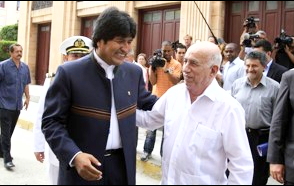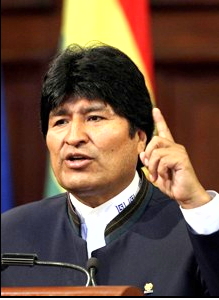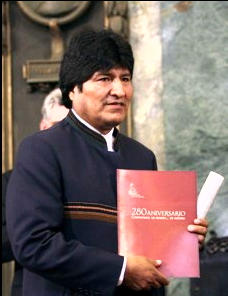
(above) Bolivia's President Evo Morales, left, speaks with Cuba's Vice President Jose Ramon Machado Ventura after a lecture at Havana's University in Cuba, Monday, Sept. 19, 2011. Morales, who is on an official visit to Cuba, received the honorary doctorate from Havana's University. photo: Associated Press

 (far left) Bolivia's President Evo Morales speaks during a lecture at Havana's University in Cuba, Monday, Sept.19, 2011. Morales, who is on an official visit to Cuba, received the honorary doctorate from Havana's University. photo: Associated Press
(far left) Bolivia's President Evo Morales speaks during a lecture at Havana's University in Cuba, Monday, Sept.19, 2011. Morales, who is on an official visit to Cuba, received the honorary doctorate from Havana's University. photo: Associated Press
(near left) Bolivia's President Evo Morales holds his honorary doctorate certificate in Havana, Cuba, Monday, Sept. 19, 2011. Morales, who is on an official visit to Cuba, received the honorary doctorate from Havana's University. photo: Associated Press
Bolivian President Morales asks SouthAm bloc to 'decertify' US on counterdrugs in tit-for-tat
September 19, 2011 - Washington Post (AP)
By Associated Press, Published: September 19
HAVANA — Bolivian President Evo Morales said Monday that a regional South American bloc should "decertify" the U.S. in its counternarcotics efforts, hitting back at Washington's criticism of his South American nation on drugs.
Speaking in Cuba while receiving an honorary doctorate from the University of Havana, Morales accused the United States of being the root cause of the international drug trade as a leading consumer of cocaine.
"If the United States can certify or decertify, why can't UNASUR (the Union of South American Nations) decertify the United States if the origin of drug trafficking is U.S. consumption of cocaine?" Morales said.
Washington first put Bolivia on its blacklist of nations that "failed demonstrably" to meet counterdrug obligations in 2008, and again renewed the designation last week. Venezuela and Burma are also on the list, which allows for possible sanctions, though President Barack Obama waived any penalties for Venezuela and Bolivia so the U.S. can support programs it says aim to help those nations' people.
Nevertheless, the designation rankles in Bolivia, which is the world's third largest producer of coca leaf, the base ingredient for cocaine. Bolivia's government says it is doing everything it can to fight cocaine trafficking.
Morales, who is still the titular head of his country's coca growers' union, objects to the leaf's classification as a controlled substance. He frequently extols its virtues in traditional uses such as brewed into a tea or chewed as a mild stimulant to ward off altitude sickness.
In 2006, he famously brandished a coca leaf during a speech to the U.N. General Assembly. Two years later he expelled U.S. Drug Enforcement Administration agents from Bolivia, accusing the DEA of inciting the autonomy-seeking opposition in eastern provinces.
"The drug trafficking (issue), just like terrorism, is fundamentally political," Morales said Monday. "Before, they accused leaders of being communists to persecute them, now its 'drug trafficker' or 'terrorist.'"
Morales' request to UNASUR is apparently symbolic in nature, as it's not clear that any resolution issued by the bloc would have a practicalimpact on Washington.
___
Associated Press writer Peter Orsi contributed to this report.